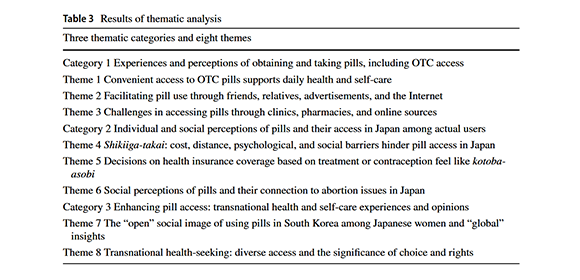
How is OC seen overseas?: Insights from Japanese women's transnational medication experiences regarding access to oral contraceptives
Researchers at Osaka University identified dilemmas on access and use of oral contraceptives among transnational Japanese patients created by different perceptions from physicians. The results revealed the clinical and ethical issues faced by transnational Japanese patients and their types of health care.
Conventionally, research on oral contraceptives (OC) in Japan has been limited to its use in the Japanese context, contraception, and in the areas of obstetrics and gynecology and women's medicine. This study identified new types of health care related to obtaining and taking OC among Japanese women by focusing on the research perspective of transnational health.
Semi-structured interviews were conducted with 11 Japanese women who had stayed in Korea for six months or longer due to study, work, marriage, etc., to investigate their experiences and perceptions of taking OC medications, including OTC drugs. Thematic analysis was conducted, and the analysis generated three thematic categories and eight themes.
In addition, by focusing on the research perspective of transnational health, a new type of healthcare for Japanese women regarding obtaining and taking OC has been identified. In particular, it was found that patients and physicians have different perceptions of OC when they see a doctor after returning home, creating a dilemma. Ethical implications for this situation were proposed. Furthermore, the researchers investigated future access in terms of patient-centered medicine and drug reclassification.
"We hope that this study will help us to understand patients and how to provide medical care at that time to resolve communication dilemmas caused by differences in perception that may occur when encountering transnational Japanese patients in clinical settings (mainly clinics) in Japan," remarked Kang Seongeun, lead author of the study. "We also expect that the research will help solve SRHR (Sexual and Reproductive Health and Rights) issues in Japan, including access to contraceptives and abortion pills including OC, unwanted pregnancy and abortion, health education and social awareness, and improve the quality of life, such as self-care for women's diseases and symptoms."
Fig. 1
Table 3. Results of thematic analysis
Credit: Kang, S., Kato, K. Transnational Health and Self-care Experiences of Japanese Women who have taken Oral Contraceptives in South Korea, including Over-the-counter Access: Insights from Semi-structured Interviews. ABR (2024). https://doi.org/10.1007/s41649-024-00293-6
Fig. 2
Table 5. Types of transnational health-seeking behaviors when participants are confined to prescription medicines
Credit: Kang, S., Kato, K. Transnational Health and Self-care Experiences of Japanese Women who have taken Oral Contraceptives in South Korea, including Over-the-counter Access: Insights from Semi-structured Interviews. ABR (2024). https://doi.org/10.1007/s41649-024-00293-6
The article, “Transnational Health and Self-care Experiences of Japanese Women who have taken Oral Contraceptives in South Korea, including Over-the-counter Access: Insights from Semi-structured Interviews,” was published in Asian Bioethics Review at
